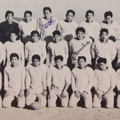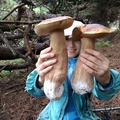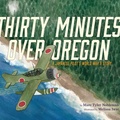>> Part 1
After a train ride, another bus ride, and a five-minute walk, I was in front of Auntie Junko’s house. She lived in a one-story stucco house separated by a short flight of stairs from the sidewalk. Her front yard was divided, a miniature grove of five or six citrus trees in the grass near the street hiding a rock garden closer to the house. In the rocks by the door sat a ceramic sculpture of a chubby raccoon-looking creature with a toothy smile and huge balls. Some kind of Japanese luck thing, though I didn’t remember what it was called.
I rang the doorbell and waited. A small face popped up in the yellow frosted glass of the window to my left and a few seconds later the door opened. “Maxie, ōkikunatta ne, you’ve gotten so tall!”
“Hi Auntie,” I said. When she hugged me she barely came up to my chest, and I could see straight down into her thinning hair. She waved me inside. I knelt to undo my shoelaces, but she stopped me.
“No, no, it’s okay, you don’t have to do that, your shoes take so long to put back on, desho? Come sit down. You must be so hungry! I haven’t made lunch yet but I made some onigiri for a snack.”
I sat on one of her couches in front of a plate of rice balls. I reached for one and Auntie sat across from me.
“How was your trip? You didn’t get lost, did you?” she asked.
“No,” I said, finishing my mouthful of rice and remembering the Serena incident for a moment, “It was fine.”
“But you’re used to taking the bus now, huh? Your mom says you take the bus every day to go to Del Mar College. That’s so wonderful.” Her whole face lit up in a smile, and she had even put on lipstick. I wondered if she had dressed up just because I was coming. I suddenly felt sad that she was so excited when I could barely remember the last time we had a conversation alone. Maybe it had never happened.
“Uh, yeah, it’s okay,” I said. “It’s not like where my sister goes to college or anything but maybe I can, uh, get good grades and transfer to Cal State Long Beach or something.” I didn’t know why I admitted that except that after a long morning on the bus, being around family felt almost comfortable.
“That would be wonderful too,” she said.
She asked me a few more questions as I ate and smiled through all my answers. Eventually she led me to her room where she had laid out some of Uncle Bill’s clothes on their mustard-colored bedspread.
“You can take anything, okay?” she said. “Look in these drawers too. He had some nice things I don’t want to give to just anybody.”
I looked at her to see if she seemed sad but her eyes were too far away to read.
“If you get hungry or want to take a break, I’ll be doing my word-search in the kitchen. Puzzles are good for my brain, you know?” She laughed a little. With that, she left the room and I was alone, staring at a bunch of old man’s clothes. I wanted them to have a good home too but I couldn’t exactly see myself wearing them. I sat on the bed for a while and thought about what to do. Thoughts of Serena and the crazy man were still hanging around in my head and I didn’t know what to do with those either. What would someone else have done if they were me? How would my brother or sister have handled it? Would they have asked the questions that were really bothering them? And then there was her phone number at the bottom of my pocket.
Mostly to keep these thoughts out of my head, I opened a drawer. Black socks, meticulously folded and organized next to a few rolled up, black belts. I could use some of those things, I guessed, though Uncle Bill was probably much thinner than me. I unrolled one of the belts and wrapped it around the waistband of my shorts. It could fit, I decided, but only if I wore my pants at my waist. Maybe one day, I thought, and put the belt in the paper bag Auntie had left out on the bed. I checked out some old, grey sweaters I would never wear, and the tweed pants that were much too short for me. I took a Dodgers hat and a pair of suede slippers. From the kitchen I could hear Auntie’s mini TV tuned to the Japanese channel and I recognized the voice of the sumo commentator from Sunday nights with my dad.
Soon, I had gotten to the last drawer. My bag held only the belt, the hat, and the slippers and I was afraid Auntie would be disappointed. Maybe I would take the socks back for my dad. My mom might even wear some of the sweaters.
In the last drawer was a dark wooden box. I picked it up carefully and lifted the lid: it was full of baseball cards, valuable ones, I thought, even though I didn’t know too much about them. I looked through them slowly, reverently, and when I spotted a Babe Ruth from the 30s, I shut the lid. Auntie had to keep these, I would tell her to be careful with them or put them on the little table where she keeps a framed 8x10 of Uncle Bill and a vase of fresh flowers.
As I went to close the drawer, I noticed a piece of faded, orange construction paper still sitting inside. I peeled it out of the drawer and turned it over. It was an elementary school project, a picture drawn with colored pencils on a piece of printer paper carefully cut out and glued to the orange background. In the picture were two people, a little boy and an old man, standing over a koi pond. Underneath, in shaky handwriting was the sentence, “My favorite thing to do is feed the fish with grampy.”
“Grampy.” Suddenly I remembered sitting in my kindergarten classroom with that picture, trying to think of how to explain Uncle Bill. He was too old to be a normal uncle, and I didn’t know my one grandpa anyway. He was the closest thing I had. I stared at the splotchy, penciled fish and remembered the koi pond, how huge the fish seemed when I was younger. It seemed like Uncle Bill was always outside by his pond, feeding the fish and checking the pH balance of the water. After he died, my mom told me, Auntie Junko tried to take care of the fish for a while but she didn’t know her way around them well enough and was too sad to remember to feed them every day. Eventually they all died and she drained the water out of the pond.
* * *
Sitting there with that drawing in my hands, I remembered driving out to Altadena with my whole family and racing my brother and sister to the door so I could be the first one to see Uncle Bill and ask him if the fish had been fed that day. Back then, he and Auntie were younger and did a lot more around the house. There was a garden where the gravel bed is now, filled with tomatoes, peppers and Japanese sweet potatoes that they used for cooking. The raccoon creature, hidden in the plants, came almost up to my head. I thought it was exciting to visit Auntie and Uncle because it always meant sushi and the koi pond and trying to hold Happy without getting scratched. On the days we came, if he remembered, Uncle Bill would always wait to feed his fish until I arrived.
One day, he realized he was out of fish food and had to go to the pet store. “You want come with me, Maksu-kun?” he asked. I was so excited, I skinned my knee a little on the way to his car. We took his grey Oldsmobile to a nearby strip mall and together we found the food his fish ate. He didn’t talk much and I liked it that way because it gave me time to look around at everything: all the different colors of fish food containers, the spider on the windshield, the fat palm trees shedding their skins into the streets.
We were almost back to the house when we stopped at a light and the man in the passenger’s seat of the car next to us rolled down his window and stuck out his head.
“Go back to where you came from,” he shouted, and spat toward Uncle Bill’s rolled-down window. The wind caught the spit and it landed in a wet glob on the window frame. Uncle Bill’s mouth twitched but he didn’t say anything. Looking straight ahead, he rolled up our windows. The light turned green and, with one sidelong glance toward me, he drove us home.
I picked up the fish drawing and the box of baseball cards and walked to the little table in the living room with Uncle Bill’s photo on it. It couldn’t have been taken that long before he died, and he looked so happy in his big, round glasses. I put the baseball cards on the table first and placed my drawing on top of them and for a while I sat there, looking at his picture and feeling bad for all the things I couldn’t remember anymore. Through the sliding door, I saw the old koi pond and the view of scraggly trees and nearby mountains behind it. Finally, I stood up and walked to the kitchen where I found Auntie watching TV and doing her word-search as promised with a magnifying glass.
“Hi, Maxie,” she said. “Did you find anything?”
“Yeah,” I said, sitting down at the table across from her. I wondered what to say, how to say it, all the things I wanted to ask but couldn’t find the words. Where does a normal person start with these things? What would my brother or sister say, or someone like Serena who talks like finding words is no big deal? “I found a Dodgers hat.” Way to go, idiot. “And I remembered some stuff about Uncle Bill I didn’t really think about for a long time.”
Auntie put down her magnifying glass. “He loved you a lot, you know.” She was smiling but I could tell she was sad at the same time too.
I looked at her feeling sad and lost for words. Maybe if I said one thing everything else would come out bit by bit when it was ready. “Uh,” I began. “Can I help you make lunch?”
“That would be wonderful,” she said.
I washed my hands at the kitchen sink, my mind racing. I thought of the things I hoped I’d be able to say one day, the drawing on the little table, and the scrap of Serena’s notebook paper in my pocket.
Outside, the koi pond filled with rain.
* * *
When we got home from the pet store that day, Uncle Bill didn’t tell anyone what had happened. We fed the fish together and I stayed outside after he returned to the house, watching the fish scramble for their lunch. Once the feeding slowed down, I walked across the bridge and crept through the side yard to the driveway. Before going back into the house, I found the garden hose and sprayed down the whole car.
© 2010 Mia Nakaji Monnier





